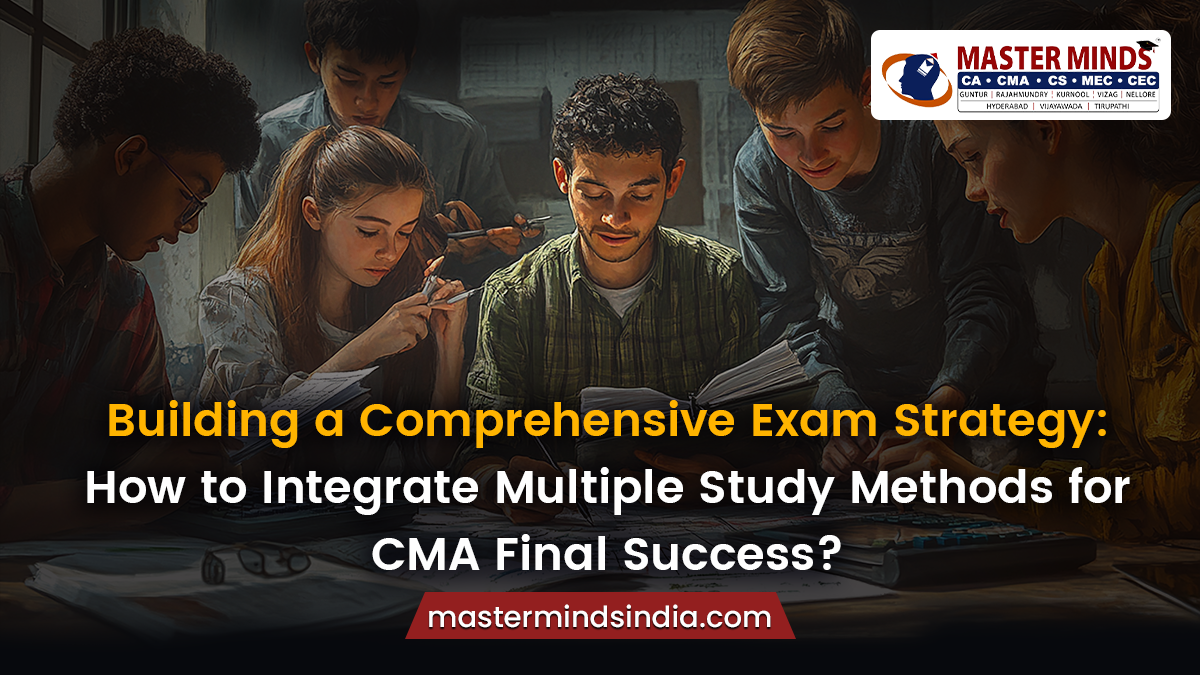Blog
How to Integrate Multiple Study Methods for CMA Final Success?

Passing the CMA Final isn’t just about studying hard—it’s about studying smart. Research shows that using multiple study methods can improve retention by up to 70%, making a huge difference in exam performance. Reading notes helps you understand concepts, but can you recall them under pressure? Can you apply them in case studies? A strong exam strategy includes active recall, spaced repetition, problem-solving, and mock tests to reinforce learning in different ways.
In this guide, we’ll explain how to combine these methods effectively so you can study efficiently, retain more, and improve your exam performance.
Crafting a Multi-Faceted Exam Strategy
Insight: A comprehensive exam strategy is akin to a carefully composed symphony, where each study method plays a crucial role in creating harmony and excellence. By integrating diverse study techniques, you create a dynamic and adaptable approach that addresses all aspects of exam preparation.
Key Components of a Comprehensive Strategy:
- Active Recall: A powerful technique that involves retrieving information from memory to reinforce learning.
- Practice Exams: Simulating exam conditions to assess your understanding and readiness.
- Targeted Reviews: Focusing on weak areas and refining your knowledge.
Action Steps:
- Assess Your Current Approach: Evaluate your current study methods and identify areas for improvement.
- Develop a Balanced Plan: Create a study schedule that incorporates active recall, practice exams, and targeted reviews.
- Monitor and Adjust: Regularly review your progress and adjust your strategy based on your performance and feedback.
Example: If you find yourself struggling with Cost Management concepts, integrate active recall sessions specifically focused on these areas, alongside regular practice exams to gauge your progress and refine your understanding.
Strengthening Your Memory
Insight: Active recall is a technique that reinforces your ability to retrieve information from memory, making it one of the most effective methods for long-term retention.
Techniques for Effective Active Recall:
- Flashcards: Create digital or physical flashcards with questions on one side and answers on the other.
- Self-Quizzing: Regularly test yourself on key concepts without referring to your notes.
- Teach-Back Method: Explain concepts to a study partner or even to yourself as if you were teaching them.
Action Steps:
- Identify Key Topics: Focus on high-priority topics or those you find most challenging.
- Schedule Regular Sessions: Allocate specific times each week for active recall practice.
- Review and Refine: Analyze your performance and adjust your recall techniques based on your strengths and weaknesses.
Example: For Financial Management, create flashcards covering key formulas and concepts. Periodically quiz yourself to ensure you can recall this information quickly and accurately.
The Role of Practice Exams
Insight: Practice exams provide a realistic simulation of test conditions, allowing you to assess your knowledge and improve your performance under timed conditions.
Effective Practice Exam Strategies:
- Full-Length Exams: Take practice exams that mimic the structure and timing of the actual CMA Final exam.
- Timed Conditions: Simulate exam conditions by timing yourself and avoiding interruptions.
- Analyze Results: Review your performance on practice exams to identify strengths and areas for improvement.
Action Steps:
- Schedule Practice Exams: Incorporate practice exams into your study schedule at regular intervals.
- Review Performance: Analyze your answers to understand where you went wrong and adjust your study focus accordingly.
- Seek Feedback: Discuss your practice exam results with mentors or peers to gain additional insights.
Example: After completing a practice exam, spend time analyzing incorrect answers and revisiting related study materials to solidify your understanding.
You Can Also Read:
- CA Intermediate New Study Material
- CA Course Duration After 10th, 12th & Graduation
- Tips to Crack CA in First Attempt
- Time-Saving Calculator Tricks for CA Foundation Students
- How to become a CA?
- CA Foundation New Syllabus
- CA Inter New Syllabus
- ICAI CA New Scheme
Focusing on Weak Areas
Insight: Targeted reviews involve honing in on specific areas where you need improvement, allowing you to address weaknesses and reinforce your knowledge.
Techniques for Effective Targeted Reviews:
- Review Sessions: Set aside time for focused review sessions on challenging topics or concepts.
- Concept Mapping: Create visual diagrams to connect related concepts and identify gaps in your understanding.
- Practice Problems: Solve additional practice problems related to weak areas to build confidence and competence.
Action Steps:
- Identify Weak Areas: Use practice exam results and self-assessment to pinpoint topics that require further review.
- Create a Review Schedule: Allocate dedicated time for reviewing these areas and incorporate different techniques to enhance learning.
- Evaluate Progress: Regularly assess your improvement in weak areas and adjust your review strategies as needed.
Example: If you find that your understanding of Direct and Indirect Taxes needs improvement, schedule focused review sessions to revisit these topics and work through additional practice problems.
Creating a Cohesive Strategy
Insight: Integrating multiple study methods creates a holistic approach to exam preparation, ensuring that you address all aspects of your learning needs and adapt to varying challenges.
Strategies for Integration:
- Balanced Schedule: Design a study plan that combines active recall, practice exams, and targeted reviews, ensuring a well-rounded approach.
- Regular Assessment: Continuously assess your progress across different study methods to gauge effectiveness and make adjustments.
- Adaptive Learning: Be flexible and adapt your strategy based on performance and feedback.
Action Steps:
- Develop a Comprehensive Plan: Create a detailed study plan that incorporates all key components and aligns with your goals.
- Implement and Monitor: Execute your plan and monitor your progress, making necessary adjustments based on outcomes.
- Reflect and Refine: Regularly reflect on your approach and refine your strategy to maximize effectiveness.
Example: Your study schedule might include weekly active recall sessions, bi-weekly practice exams, and targeted review sessions for specific topics based on practice exam results.
CA & CMA Online Classes:

